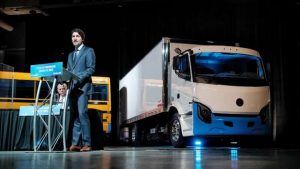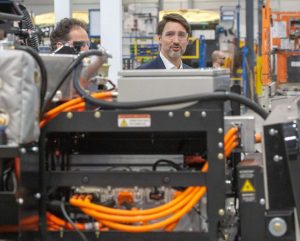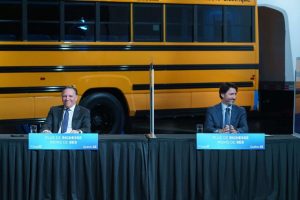Quebec, Ottawa invest $100M to build electric vehicle battery plant

Prime Minister Justin Trudeau and Quebec Premier François Legault used the announcement Monday of a joint $100-million investment in an electric vehicle manufacturer to showcase their respective visions for the post-pandemic economic recovery.
The investment will take the form of a loan to Lion Electric, a Saint-Jérôme-based company that makes electric trucks and school buses. Roughly $30 million will be forgivable if the company meets certain conditions, including keeping jobs in Quebec.
Lion Electric plans to use the funding to build a new $185-million factory in Saint-Jérôme, north of Montreal, where it will assemble battery packs for its vehicles. That would allow it to cut unit costs and potentially capitalize on the growing market for greener transportation options.
The company said it expects to employ 135 people at the plant when it is operational by 2023. It also plans to invest in a research and development facility that could create a number of spinoff jobs.
“When we talk about an economic recovery that’s good for workers, for families and for the environment, this is exactly the kind of project we mean,” Trudeau said at a news conference in Montreal.

It was the prime minister’s first trip to Montreal in more than a year. He said one of the reasons he decided to attend the announcement was to illustrate the importance of the green economy for future job growth.
The project also aligns with the Legault government’s desire to create a supply chain within Quebec that is able to feed the electric vehicle industry.
At Monday’s announcement, Economy Minister Pierre Fitzgibbon spoke at length about the province’s deposits of lithium and nickel — key components in electric vehicle batteries — as well as its supply of low-emission hydroelectricity.
“If we play our cards right, we could become world leaders in this market of the future,” Fitzgibbon said.
Currently, many of those strategic minerals found in Quebec are exported to Asia where they are turned into battery cells, and then imported back to Quebec by companies like Lion, said Mickaël Dollé, a chemistry professor at the Université de Montréal.
By opening a battery assembly plant in Quebec, Lion could help stimulate more cell-makers to set up shop in the province. Further localizing the supply chain, Dollé said, means better value and a greener product.
But other countries have the same goal in mind, he said, and the window for the province to establish itself as an important player in the emerging electric vehicle battery industry is closing quickly.
“The decision has to be taken now, or in the coming months, but if we wait too long we may miss our main goal which is to get our own supply chain in Canada,” Dollé said.
What’s in a name?
Monday’s announcement was closely watched in Quebec for what it foretold about the political future as well as the economic one.
By coming to Montreal and touring a vaccination clinic before making the funding announcement, Trudeau fed speculation in the province that he is preparing to call an election soon.
Intrigue also surrounded the informal meeting Trudeau had with Legault on Monday. The Quebec premier and members of his government have repeatedly expressed frustration with Trudeau during the pandemic.

Among other things, they have blamed Ottawa for delays in monitoring incoming travellers and are adamantly opposed to Trudeau’s idea of implementing national standards for elderly care, which is seen by Quebec as jurisdictional overreach.
Several political observers in the province have noted that Legault often refers to Trudeau publicly as “Justin” when discussing disagreements with the federal government.
Both attempted to downplay their differences on Monday. “He calls me François,” Legault said, responding to a question about his relations with Trudeau.
“No one expects the federal government and the provinces to agree about everything, but they expect us to work together in a collaborative way,” Trudeau said.
Sources in the Quebec government told Radio-Canada that the two discussed health-care funding on Monday, one of the more urgent issues Legault wants to see resolved.
His finance minister, Eric Girard, will table a budget on March 25 with a $15-billion deficit, caused mainly by pandemic-related spending.
Laws in the province require the government to balance the budget by 2025-26, and Legault has made it clear in recent interviews he is counting on increased health transfers to cover some of the gap.








Redes Sociais - Comentários